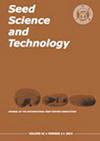Tetrazolium test for evaluating viability of stored rice (Oryza sativa) seeds
IF 3
4区 农林科学
Q2 AGRONOMY
引用次数: 0
Abstract
Germination testing of rice seeds takes 14 days, while the tetrazolium test can characterise seed viability in hours. The goal of this study was to evaluate the viability of stored rice seeds cv. Chiang Phatthalung by a practical and efficient tetrazolium method. Seeds were stored at room temperature (28°C) and in cold storage (10°C) for 0, 3, 6, 9 and 12 months and then their viability and physiological quality was tested. Seeds of all treatments were soaked in water for 18 hours, cut longitudinally and immersed in 1% tetrazolium solution for two hours at 30°C according to the ISTA method, or in tetrazolium solution at different concentrations (0.0625, 0.125, 0.25 and 0.5%) and staining temperatures (30, 35, 40 and 45°C). The modified tetrazolium test with 0.125% tetrazolium concentration and staining at 40°C of stored rice seeds correlated positively with standard germination (r = 0.98, P < 0.01), soil seedling emergence (r = 0.98, P < 0.01), shoot length (r = 0.78, P < 0.01), root length (r = 0.81, P < 0.01) and seedling dry weight (r = 0.75, P < 0.01). Thus, this staining condition can be used to efficiently estimate the viability of freshly harvested and stored rice seeds.评价储藏水稻种子活力的四氮唑试验
水稻种子的发芽测试需要14天,而四氮唑测试可以在几个小时内确定种子的活力。本研究的目的是评价储藏水稻种子的活力。蒋法隆采用实用高效的四氮唑方法。将种子在室温(28°C)和冷藏(10°C)中分别保存0、3、6、9和12个月,并对其活力和生理品质进行检测。所有处理的种子在水中浸泡18小时,纵向切开,在1%四唑铵溶液中浸泡2小时,条件为30°C (ISTA法),或在不同浓度(0.0625、0.125、0.25和0.5%)和染色温度(30、35、40和45°C)的四唑铵溶液中浸泡。改良四氮唑浓度为0.125%的四氮唑试验和40℃染色与标准发芽率(r = 0.98, P < 0.01)、土壤出苗率(r = 0.98, P < 0.01)、茎长(r = 0.78, P < 0.01)、根长(r = 0.81, P < 0.01)和幼苗干重(r = 0.75, P < 0.01)呈正相关。因此,这种染色条件可以用来有效地估计新鲜收获和储存的水稻种子的活力。
本文章由计算机程序翻译,如有差异,请以英文原文为准。
求助全文
约1分钟内获得全文
求助全文
来源期刊

Seed Science and Technology
农林科学-农艺学
CiteScore
3.00
自引率
28.60%
发文量
36
审稿时长
>36 weeks
期刊介绍:
Seed Science and Technology (SST) is an international journal featuring original papers and articles on seed quality and physiology related to seed production, harvest, processing, sampling, storage, genetic conservation, habitat regeneration, distribution and testing. A journal that meets the needs of researchers, advisers and all those involved in the improvement and technical control of seed quality. Published every April, August and December.
 求助内容:
求助内容: 应助结果提醒方式:
应助结果提醒方式:


